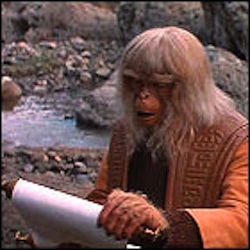By now, one thing about the Apes film series should be pretty clear: despite their goofiness, these are not family-friendly science fiction films. In fact, every single movie is some kind of cynical downer. And though each movie explores the darkside of humanity (and sentience) in different ways, the bare bones message is usually the same: why the hell are humans in charge of the planet anyway? In the first film, Heston’s George Taylor articulated the overall proposition of the entire series when he wondered aloud if there was anything “better than man.” The Apes series then gave us a science fiction lens to see if there was something better.
What about intelligent apes? Would they be better? Even when the apes violently took over in Conquest the answer was almost always “yes.” But then came the supposed last installment in the Apes saga. And suddenly the message was different: can’t we all just get along?
Throughout my rewatches of the Apes films I’ve taken several potshots at the continuity problems and massive plot stunts within each film and how those issues relate to the other films. Outside of the first film, every single sequel has some kind of absurd premise you have to go with in order to get through the movie. And by absurd premise, I mean absurd within the context of the Planet of the Apes concept. In Beneath you had to get over this idea that Earth would really send an astronaut out looking for Taylor. In Escape you just had to accept the fact that Zira, Cornelius, and Milo just happened to jump on a spaceship before the planet exploded. In Conquest you had to somehow believe this slave society came into existence in just about 19 years. But these are minor quibbles, like overlooking the fact that your lover is a messy eater when it comes to pies or chicken wings. But with Battle the continuity is so bad it’s like your lover has food smeared all over their face 24 hours a day.
 To begin with, the amount of time that has passed between Conquest and Battle is unclear. The film begins with an awesome voice-over from John Huston as the Lawgiver speaking from the year 2670. He is narrating from the sacred scrolls, and proceeds to flash us back to the early 21st century, which he calls the “far off days.” At this point we’re told a big nuclear holocaust has totally happened, but Caesar along with a group of humans and apes have set up a village where they’re all going to try and live in harmony. The apes are clearly in charge as there are all kinds of laws about what humans can and can’t do. The biggest reparation here is the fact humans can never use the word “no” towards an ape.
To begin with, the amount of time that has passed between Conquest and Battle is unclear. The film begins with an awesome voice-over from John Huston as the Lawgiver speaking from the year 2670. He is narrating from the sacred scrolls, and proceeds to flash us back to the early 21st century, which he calls the “far off days.” At this point we’re told a big nuclear holocaust has totally happened, but Caesar along with a group of humans and apes have set up a village where they’re all going to try and live in harmony. The apes are clearly in charge as there are all kinds of laws about what humans can and can’t do. The biggest reparation here is the fact humans can never use the word “no” towards an ape.
As silly as this sounds, I actually like this little detail because it seems like a realistic thing that would actually happen in this ill-advised shared society. Also, I sort of get the sense that Ronald D. Moore and company were inspired by this tenuous situation when they were writing the New Caprica stuff for BSG. In rewatching this film, I kept expecting to have Lucy Lawless or Dean Stockwell turn around the corner and say, “This isn’t working. Apes (Cylons) and humans can’t live together. Let’s blow them all up with that nuke Baltar is hiding.”
But Caesar is trying to make it work, despite the fact that the gorillas are making trouble by questioning his authority. I’m glad the gorillas aren’t total jerks throughout the entire movie; otherwise it would feel a little cheap, like all the problems of the series were being retroactively pinned on the war-like gorillas. Either way, one gorilla in particular is making trouble and trying to not only undermine the humans, but Caesar, too. For his part, Caesar seems to have settled down quite a bit since the last film. Caesar has a human friend named MacDonald, (Austin Stoker) who is not the same MacDonald (Hari Rhodes) from the last movie. Instead, we’re randomly told this guy is MacDonald’s brother. How old is MacDonald-2 then? He looks about 30 something. Now if the fallout was at least 27 years prior (we get this line from an ape who runs the village armory) this would mean MacDonald-2 was a little kid when it happened. Was MacDonald-1 his MUCH older brother? Did they have different moms or different dads?
Wait. How old is Caesar now? If he was born in 1970 something and Conquest takes place in 1991, then he would have been in his 20s. So he’s 50 now? But this isn’t even the half of it because there’s another big, big question. Where did all the TALKING apes coming from in just 20 to 30 years? Other than Lisa saying “no” right at the end Caesar was the only ape who could speak in Conquest, but now there’s a whole society of talking apes. And it’s happened in less than 50 years! What? Okay, okay, if you keep thinking about this, you won’t be able to get through the movie.
The story ends up being about three things. First, because Caesar and his pals just had to go to the Forbidden City, they’ve provoked a group of Mad Max style humans, who are now plotting to attack them. Second, the gorilla General Aldo (Claude Akins) is trying to take over the ape village and get rid of all the humans and ultimately get rid of Caesar. Third, and probably most interesting, Caesar seems to think that he has the ability to alter the bleak future from which his parents came from, thus preventing the events of the first two films. After a scientific orangutan named Virgil (Paul Williams) talks about theories of various timelines, Caesar practically turns to the camera and says, “I know what I would change.”
Also, Caesar and his mate Lisa (Natalie Trudy) have a son named Cornelius (Bobby Porter) who seems to be about 8 or 9. Initially when I realized the kid’s name was Cornelius, I got excited, thinking the Cornelius from the first film had somehow become his own grandfather. However, that turns out not to be the case for the very specific reason that little Cornelius is tragically killed by General Aldo. Even though Battle was trying to be a little bit more upbeat, it still couldn’t resist killing off a child! Gotta love these dark, dark Apes movies.
Eventually Caesar manages to thwart the mutant human invasion force and bring peace back to the ape village. The movie then flashes back to 2670 where we see the Lawgiver reading to both human and ape children together. This means Caesar has changed history now, right? The oppressive planet of the apes from the first two films has been replaced with an alternate dimension of peace and love and free candy for everyone.
Not necessarily. Two of the mutant humans in the Forbidden City still have the alpha omega bomb, and in a scene deleted from the theatrical release, they talk about how they’re going to keep it around and even kind of start worshipping it. So that checks with everything in Beneath. Further, this happy-go-lucky future the Lawgiver depicts is happening in 2670. But, we know from numerous lines that Taylor and Zira’s planet of the apes exists in the 3950s. So, there is still PLENTY of time for everything to go to hell and for the apes to start enslaving the humans and for them to lose the ability to talk. Meaning the ending of Battle is a cheat. It depicts a happy future for the purposes of making ONE of the Apes films not end in a depressing bloodbath, but it also kind of gets away with keeping continuity somewhat in check. It’s as though the film began cheating on the Apes continuity, but then started to feel guilty about it, so it tried to apologize by inserting the thing with the alpha omega bomb. In short, the true believers can reconcile this with the other films, while the casual viewer thinks there is a new, happy ending.

Battle for the Planet of the Apes isn’t near as good as its two predecessors, in fact it is probably the worst one in the original series. However, if you just forget about the continuity problems, the exploration of Caesar’s attempt to create peace is sort of fun and interesting. Despite sending a mixed-message both thematically and in terms of narrative, Battle still feels like one of the Apes films. Yes, the ending scene in which a statue of Caesar cries is totally ridiculous, but if you’ve made it this far, chances are you’ll cry right along with him. In spite of yourself.
Ryan Britt is a staff writer for Tor.com. He imagines there is a whole book inside of him about the Apes movies.









